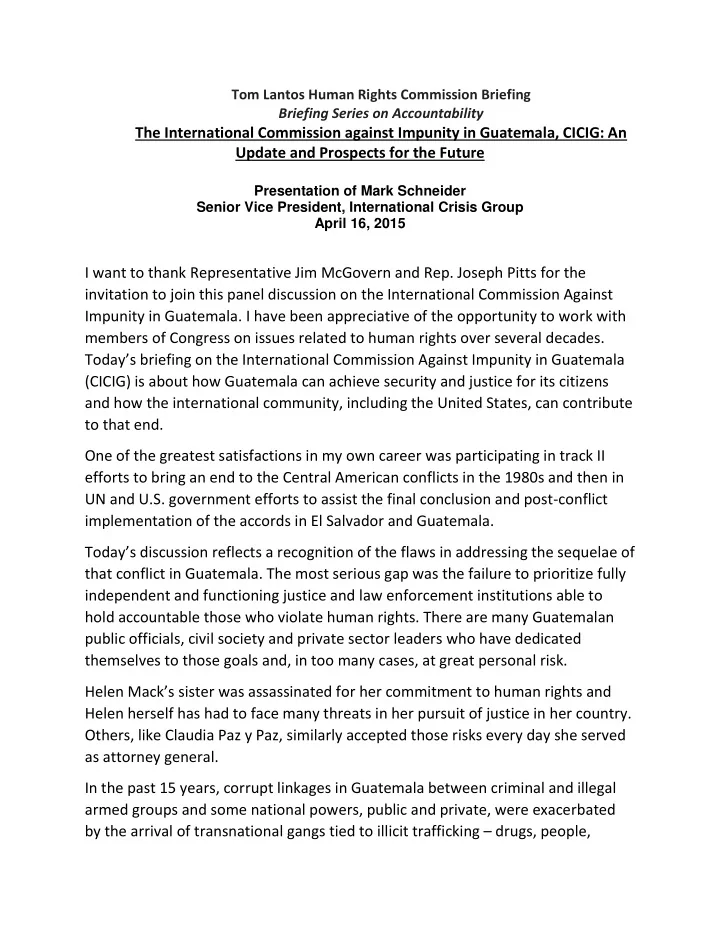

Tom Lantos Human Rights Commission Briefing Briefing Series on Accountability The International Commission against Impunity in Guatemala, CICIG: An Update and Prospects for the Future Presentation of Mark Schneider Senior Vice President, International Crisis Group April 16, 2015 I want to thank Representative Jim McGovern and Rep. Joseph Pitts for the invitation to join this panel discussion on the International Commission Against Impunity in Guatemala. I have been appreciative of the opportunity to work with members of Congress on issues related to human rights over several decades. Today’s briefing on the International Commission Against Impunity in Guatemala (CICIG) is about how Guatemala can achieve security and justice for its citizens and how the international community, including the United States, can contribute to that end. One of the greatest satisfactions in my own career was participating in track II efforts to bring an end to the Central American conflicts in the 1980s and then in UN and U.S. government efforts to assist the final conclusion and post-conflict implementation of the accords in El Salvador and Guatemala. Today’s discussion reflects a recognition of the flaws in addressing the sequelae of that conflict in Guatemala. The most serious gap was the failure to prioritize fully independent and functioning justice and law enforcement institutions able to hold accountable those who violate human rights. There are many Guatemalan public officials, civil society and private sector leaders who have dedicated themselves to those goals and, in too many cases, at great personal risk. Helen Mack’s sister was assassinated for her commitment to human rights and Helen herself has had to face many threats in her pursuit of justice in her country. Others, like Claudia Paz y Paz, similarly accepted those risks every day she served as attorney general. In the past 15 years, corrupt linkages in Guatemala between criminal and illegal armed groups and some national powers, public and private, were exacerbated by the arrival of transnational gangs tied to illicit trafficking – drugs, people,
contraband. By early in the 21 st century, that vile network threatened the essence of the Guatemalan state. That threat generated a demand from organized citizens for an independent entity like CICIG, able to investigate those networks, build prosecutions, and propose legislative reforms. Its mandate was accepted by the Guatemalan government, and it has been financed by the U.S. and other donors. And that decision by Guatemala has been amply justified. Beyond what you have heard, let me add a few other indicators of CICIG accomplishments over the past several years, working with the best parts of the Guatemalan justice system: four years ago more than 90 per cent of homicides and serious crimes went unpunished. Now the percentage is far lower and dozens of Zetas have been arrested, tried and convicted; homicide rates dropped last year below the levels of 2001 for the first time and kidnapping reports are a third of what they were five years ago; former president Alfonso Portillo pleaded guilty to bribery charges in a New York court and served time; the patriarch of the Lorenzano crime clan, Waldemar Lorenzano was extradited to the US, several of his sons indicted and detained; 1700 corrupt cops were dismissed, two heads of the national police and at least two vice ministers of interior have been dismissed and prosecuted, and the head of the national prison system also has been charged; Only last September, Byron Lima was charged by CICIG with running extortion and other illegal operations while in prison and the head of the national prison system Edgar Camargo and other officials were accused in relation to that operation. Lima is an ex-army captain who is serving a twenty- year sentence for the 1998 assassination of Bishop Juan Gerardi. According to CICIG head Iván Velásquez, Lima was the “true authority” within the prison system, dispensing transfers, favours and rights to inmates; In November Harold Mendoza, the head of the Mendoza criminal organization and nine others were arrested after a CICIG investigation;
Probably the most far-reaching impact of CICIG investigations was its uncovering the conspiracy related to the death of attorney Rodrigo Rosenberg aimed at toppling former President Colom. With respect to institutional strengthening, CICIG continues to vet prosecutors for the Ministerio Publico, to transfer knowledge on forensics and other prosecutorial mechanisms. It also helped design the high impact courts that have enabled some of the worst criminals to be convicted. And it helped draft many of the criminal justice reform laws that have helped permit successful prosecutions by protecting judges, prosecutors, defendants, and witnesses. The International Crisis Group has been reporting on the threat of transnational crime and illegal armed groups to the citizens and the state in Guatemala for nearly five years. Our second report was on CICIG. Last June we emphasized the ongoing dangers in the corridor of violence between Honduras and Guatemala where homicide rates from San Pedro Sula up through Copan to Chiquimula, Zacapa and Izabal make it one of the most deadly cross border stretches of land in the world. The on-going dangers in Guatemala are shown by the murder of seven human rights defenders in 2014; its prison system is overburdened with three times the numbers of prisoners it was designed to hold; and it remains one of the most dangerous countries on earth for journalists, even before three journalists were killed last month in Suchitepequez . Guatemala is right now at a crucial turning point in the struggle to strengthen the rule of law, and the outcome is uncertain. In a strange way, this decision point for Guatemala comes at a time when the Obama Administration proposes to make a commitment to support governance and security not seen since the signing of the peace treaty nearly 20 years ago. The single overriding demand from donors and from Guatemalans is that the government make a parallel commitment. Extending CICIG beyond September 2015 will demonstrate that commitment.
Recommend
More recommend